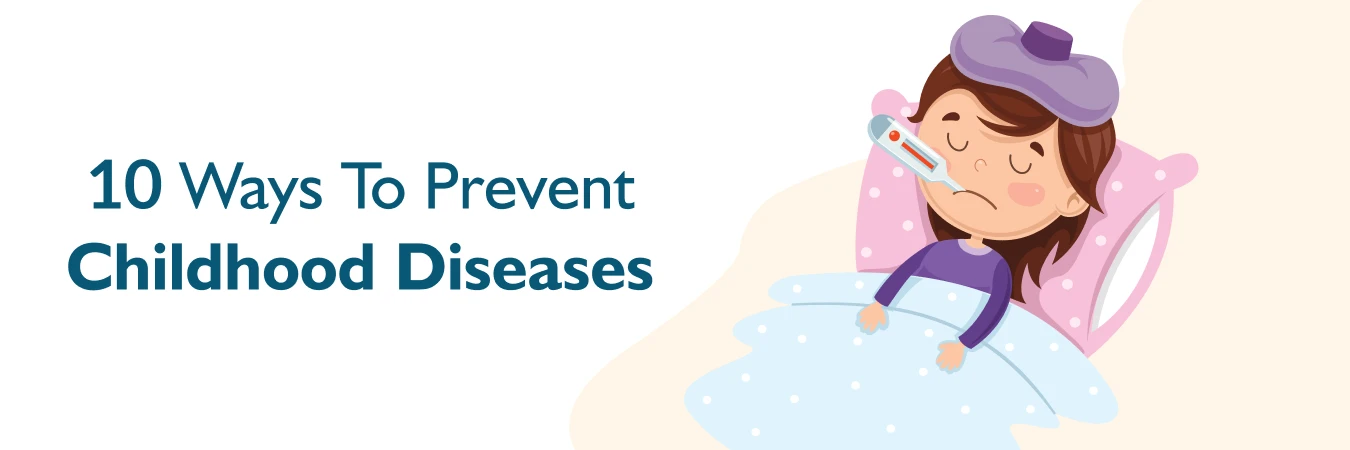- Cardiology 84
- Dermatology 45
- Endocrinology 33
- ENT 16
- Fertility 190
- Gastroenterology 78
- General-Medicine 81
- Gynecology 80
- Hematology 19
- Infectious-Diseases 33
- Neurology 52
- Oncology 34
- Ophthalmology 23
- Orthopedics 69
- Pediatrics 31
- Procedure 23
- Public-Health 144
- Pulmonology 59
- Radiology 8
- Urology 68
- Wellness 161
- Woman-and-child 77

10 Essential Tips for Preventing Childhood Diseases
Childhood is a critical phase of life where the foundation for lifelong health is laid. Preventing childhood diseases is of paramount importance, as it not only ensures the well-being of children but also sets the stage for their future.
In this blog, we'll delve into 10 effective ways to prevent childhood diseases and help children grow up in a healthier environment. By following these simple ideas, we can ensure that the future for our children is full of good health, energy, and happiness.
All of this is made possible with the knowledge of the best children's doctors and a hospital that truly cares about kids.
Tips for Preventing Childhood Illnesses
Ensuring the health and well-being of children is a top priority for parents and caregivers. Preventing illnesses in childhood can set the stage for a healthier life. Here are ten amazing tips to help keep your children healthy and illness-free.
Secure your health with a second opinion. Make informed decisions and book your appointment today!
Get A Second OpinionGet Recommended Vaccinations
Vaccines are one of the most effective ways to prevent severe childhood illnesses. Make sure your child receives all the recommended vaccinations on schedule. This includes vaccines for diseases like measles, mumps, chickenpox, and the flu.
Encourage Handwashing
Teach your child to wash their hands frequently, especially before eating, after using the bathroom, and after playing outside or with toys. Proper handwashing with soap and water is key to preventing the spread of germs.
Cover Coughs and Sneezes
Instruct your child to cough or sneeze into their elbow or a tissue, not their hands. This helps stop the spread of respiratory illnesses like colds and flu.
Disinfect Surfaces
Regularly clean and disinfect high-touch surfaces like doorknobs, toys, and electronics to kill germs that can cause illness.
Encourage a Healthy Lifestyle
Make sure your child eats a nutritious diet, gets enough sleep, and stays physically active. This supports a strong immune system to fight off infections.
Breastfeed if Possible
Breastfeeding provides antibodies that can help protect infants from many illnesses in the first year of life.
Ready to take control of your health journey? Book your appointment now and start your path towards wellness today!
Book an AppointmentAvoid Contact with Sick People
When possible, limit your child's exposure to people who are sick, especially in the first few months of life when their immune system is still developing.
Dress for the Weather
Dressing your child appropriately for cold, wet, or windy weather can help prevent illnesses like cold and flu.
Manage Stress
Finding ways to manage stress and anxiety in your child can support their overall health and immune function.
Stay Up-to-Date on Checkups
Regular well-child visits allow your paediatrician to monitor your child's health, provide recommended preventive care, and address any concerns early.
Conclusion
Common childhood health diseases can be prevented through a combination of vaccination, good hygiene practices, and a healthy lifestyle. Vaccines are the most effective way to protect children from serious illnesses, while handwashing, avoiding close contact with sick people, and maintaining a balanced diet can also help reduce the risk of infection. By following these preventive measures, parents can ensure their children grow up healthy and strong.
Frequently Asked Questions
The 7 most common childhood diseases are:
- Measles
- Mumps
- Rubella (German measles)
- Pertussis (whooping cough)
- Varicella (chickenpox)
- Polio
- Diphtheria
The 5 most common childhood illnesses are:
- Common cold
- Ear infections
- Respiratory infections
- Gastroenteritis (stomach flu)
- Asthma
Preventing childhood diseases is crucial to ensure the well-being and healthy development of children. It protects them from immediate health risks and sets the foundation for a healthier adulthood.
The spread of childhood infections can be minimized by:
- Frequent handwashing
- Immunizations
- Proper hygiene practices
- Isolating sick children
- Avoiding close contact with infected individuals
Disease control methods include:
- Vaccination and immunization
- Hygiene and sanitation practices
- Quarantine and isolation measures
- Health education and awareness
- Surveillance and early detection
Diseases are prevented and controlled through a combination of measures including vaccination, public health campaigns, access to clean water and sanitation, health education, early detection, and appropriate medical treatment.
To prevent noncommunicable diseases:
- Maintain a healthy diet
- Engage in regular physical activity
- Avoid tobacco and excessive alcohol consumption
- Manage stress effectively
- Get regular health check-ups
Rarest childhood diseases can include conditions like:
- Hutchinson-Gilford Progeria Syndrome (aging disorder)
- Fibrodysplasia Ossificans Progressiva (ossification of soft tissues)
- Cockayne Syndrome (premature aging and growth failure)
- Niemann-Pick disease (lipid storage disorder)
- Maple Syrup Urine Disease (metabolic disorder)

- Cardiology 2132
- Dermatology 168
- Endocrinology 135
- ENT 97
- Fertility 217
- Gastroenterology 232
- General 478
- General-Medicine 1685
- Gynecology 169
- Hematology 85
- Infectious-Diseases 208
- Neurology 207
- Oncology 345
- Ophthalmology 65
- Orthopedics 187
- Pediatrics 83
- Procedure 72
- Public-Health 209
- Pulmonology 126
- Radiology 13
- Second Opinion 311
- Urology 294
- Wellness 600
- Woman-and-child 447
Related Blogs
If you have any questions, please fill out the enquiry form or call us, and we will get back to you promptly.
040-68334455